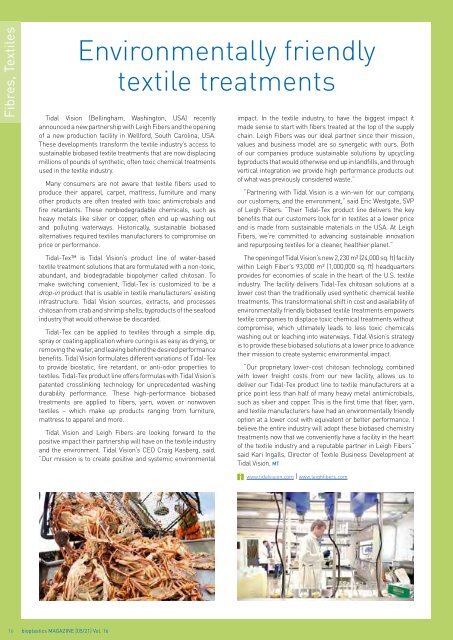issue 05/2021
Highlights: Fibres, Textiles, Nonwovens Biocomposites Basics: CO2-based plastics
Highlights:
Fibres, Textiles, Nonwovens
Biocomposites
Basics: CO2-based plastics
Create successful ePaper yourself
Turn your PDF publications into a flip-book with our unique Google optimized e-Paper software.
Fibres, Textiles<br />
Environmentally friendly<br />
textile treatments<br />
Tidal Vision (Bellingham, Washington, USA) recently<br />
announced a new partnership with Leigh Fibers and the opening<br />
of a new production facility in Wellford, South Carolina, USA.<br />
These developments transform the textile industry’s access to<br />
sustainable biobased textile treatments that are now displacing<br />
millions of pounds of synthetic, often toxic chemical treatments<br />
used in the textile industry.<br />
Many consumers are not aware that textile fibers used to<br />
produce their apparel, carpet, mattress, furniture and many<br />
other products are often treated with toxic antimicrobials and<br />
fire retardants. These nonbiodegradable chemicals, such as<br />
heavy metals like silver or copper, often end up washing out<br />
and polluting waterways. Historically, sustainable biobased<br />
alternatives required textiles manufacturers to compromise on<br />
price or performance.<br />
Tidal-Tex is Tidal Vision’s product line of water-based<br />
textile treatment solutions that are formulated with a non-toxic,<br />
abundant, and biodegradable biopolymer called chitosan. To<br />
make switching convenient, Tidal-Tex is customized to be a<br />
drop-in product that is usable in textile manufacturers’ existing<br />
infrastructure. Tidal Vision sources, extracts, and processes<br />
chitosan from crab and shrimp shells, byproducts of the seafood<br />
industry that would otherwise be discarded.<br />
Tidal-Tex can be applied to textiles through a simple dip,<br />
spray or coating application where curing is as easy as drying, or<br />
removing the water, and leaving behind the desired performance<br />
benefits. Tidal Vision formulates different variations of Tidal-Tex<br />
to provide biostatic, fire retardant, or anti-odor properties to<br />
textiles. Tidal-Tex product line offers formulas with Tidal Vision’s<br />
patented crosslinking technology for unprecedented washing<br />
durability performance. These high-performance biobased<br />
treatments are applied to fibers, yarn, woven or nonwoven<br />
textiles – which make up products ranging from furniture,<br />
mattress to apparel and more.<br />
Tidal Vision and Leigh Fibers are looking forward to the<br />
positive impact their partnership will have on the textile industry<br />
and the environment. Tidal Vision’s CEO Craig Kasberg, said,<br />
“Our mission is to create positive and systemic environmental<br />
impact. In the textile industry, to have the biggest impact it<br />
made sense to start with fibers treated at the top of the supply<br />
chain. Leigh Fibers was our ideal partner since their mission,<br />
values and business model are so synergetic with ours. Both<br />
of our companies produce sustainable solutions by upcycling<br />
byproducts that would otherwise end up in landfills, and through<br />
vertical integration we provide high performance products out<br />
of what was previously considered waste.”<br />
“Partnering with Tidal Vision is a win-win for our company,<br />
our customers, and the environment,” said Eric Westgate, SVP<br />
of Leigh Fibers. “Their Tidal-Tex product line delivers the key<br />
benefits that our customers look for in textiles at a lower price<br />
and is made from sustainable materials in the USA. At Leigh<br />
Fibers, we’re committed to advancing sustainable innovation<br />
and repurposing textiles for a cleaner, healthier planet.”<br />
The opening of Tidal Vision’s new 2,230 m² (24,000 sq. ft) facility<br />
within Leigh Fiber’s 93,000 m² (1,000,000 sq. ft) headquarters<br />
provides for economies of scale in the heart of the U.S. textile<br />
industry. The facility delivers Tidal-Tex chitosan solutions at a<br />
lower cost than the traditionally used synthetic chemical textile<br />
treatments. This transformational shift in cost and availability of<br />
environmentally friendly biobased textile treatments empowers<br />
textile companies to displace toxic chemical treatments without<br />
compromise, which ultimately leads to less toxic chemicals<br />
washing out or leaching into waterways. Tidal Vision’s strategy<br />
is to provide these biobased solutions at a lower price to advance<br />
their mission to create systemic environmental impact.<br />
“Our proprietary lower-cost chitosan technology, combined<br />
with lower freight costs from our new facility, allows us to<br />
deliver our Tidal-Tex product line to textile manufacturers at a<br />
price point less than half of many heavy metal antimicrobials,<br />
such as silver and copper. This is the first time that fiber, yarn,<br />
and textile manufacturers have had an environmentally friendly<br />
option at a lower cost with equivalent or better performance. I<br />
believe the entire industry will adopt these biobased chemistry<br />
treatments now that we conveniently have a facility in the heart<br />
of the textile industry and a reputable partner in Leigh Fibers”<br />
said Kari Ingalls, Director of Textile Business Development at<br />
Tidal Vision. MT<br />
www.tidalvision.com | www.leighfibers.com<br />
16 bioplastics MAGAZINE [<strong>05</strong>/21] Vol. 16

















